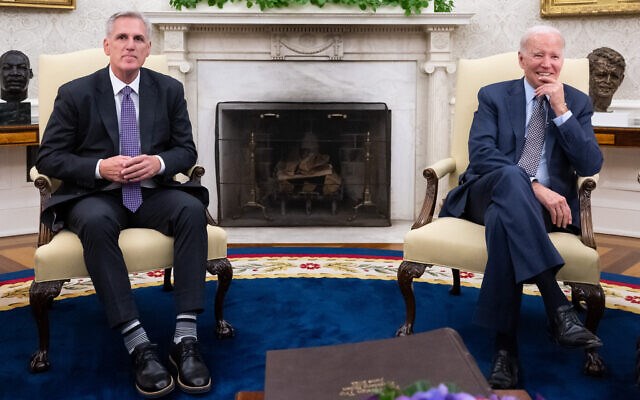Biden, McCarthy debt talks end with no deal in sight
Disagreements still block any potential deal to avert a calamitous debt default.
-

US President Joe Biden meets with US House Speaker Kevin McCarthy (R-CA) (L) about the debt ceiling in the Oval Office of the White House in Washington, DC, on May 22, 2023. (AFP)
US House Speaker and President Joe Biden on Monday both said their first one-on-one talks in months to avoid a calamitous debt default were "productive" but that disagreements were still blocking any possible deal.
The White House meeting came after Biden cut off a short trip to Asia to recommence talks in advance of the US Treasury's June 1 deadline for Congress to authorize more borrowing.
"I felt we had a productive discussion. We don't have an agreement yet, but I did feel the discussion was productive in areas (where) we have differences of opinion," House Speaker Kevin McCarthy said after the talks.
McCarthy told journalists that negotiators were going to "work through the night" to move the sides closer and that he and Biden would "talk every day to try to find a way to get this done."
As they sat down for the meeting, Biden said, "I am optimistic we are going to make some progress," adding both sides understood they have "a significant responsibility" to solve the impasse.
Afterward, the President used a similar rhetoric as McCarthy in a statement, describing the meeting as "productive" while adding that "areas of disagreement" remain.
'A lack of urgency'
After Monday's Oval Office meeting and McCarthy's description of the talks as productive, his team adopted a heavy tone, with Republican congressman and negotiator Patrick McHenry telling reporters, "What I sense from the White House is a lack of urgency."
Republicans hold on to their stance on spending less money in fiscal year 2024 than in 2023, calling it a "red line."
The White House has offered a freeze for 2024 in exchange for Republicans supporting tax increases for corporations and wealthy Americans, but McCarthy has rejected the idea.
The Biden administration has suggested limiting spending on some domestic programs but needs the Pentagon to share in the cuts.
Meanwhile, Republicans have pressured for boosted military and border security spending, with major rollbacks to non-defense programs.
Disagreements also persist over what a White House source described as "increasingly hard-line Republican demands" for increased work requirements for social assistance programs.
Biden highlighted that Republicans lifted the borrowing cap three times under his predecessor Donald Trump without threatening to default on the country's debt obligations.
If lawmakers do not lift the borrowing limit, the country would default for the first time in history, with potentially disastrous consequences.
Many analysts believe that in the worst-case scenario, global stock markets will crash as the US economy enters a downward spiral, resulting in the loss of millions of jobs.
Read more: US Treasury: debt default will make the world not invest in dollars

 3 Min Read
3 Min Read








